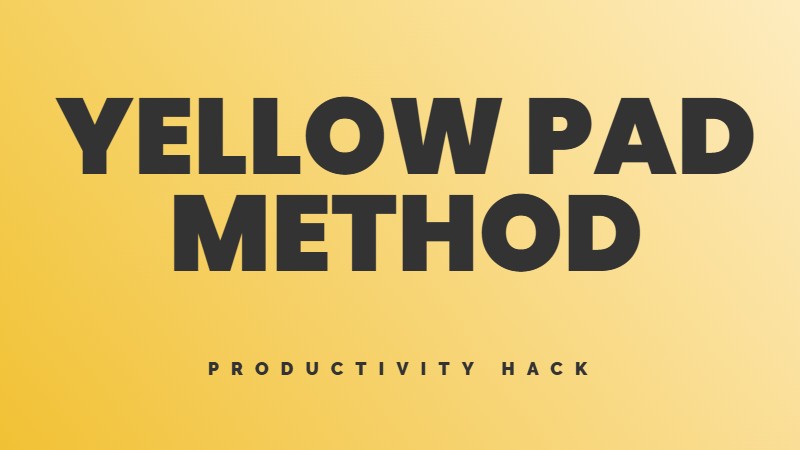Writing is a powerful tool that can enhance our mental health and well-being. Many studies have shown that writing about our emotions, experiences, and goals can help us cope with stress, gain insight, and achieve personal growth. In this article, I will review some of these studies, the methods used, and the results obtained. I will also discuss what these studies mean for us and how we can apply them to our own lives for better clarity, focus and well-being.
Writing and Focus
Focus is concentrating on a specific task or goal and ignoring distractions. It is an essential skill for learning, working, and achieving our objectives. However, many factors, such as stress, anxiety, boredom, or fatigue, can impair our focus.
One way to improve our focus is to write about our goals. Writing can help us clarify and prioritize our goals and plan the steps to achieve them. Writing can also help us monitor our progress and evaluate our outcomes. Writing can also help us boost our motivation and overcome obstacles.
One study that examined the effect of writing on focus was conducted by Morisano et al. (2010). They compared two types of writing: goal-setting and expressive writing. Goal-setting is a form of writing that involves specifying and committing to a personal goal. Expressive writing is a form of writing that involves writing about one’s thoughts and feelings. The researchers randomly assigned 85 students on academic probation to write about their goals or write expressively for four sessions. The researchers also measured the student’s academic performance before and after the intervention.
The results showed that goal-setting writing improved the students’ academic performance more than expressive writing. The students who wrote about their goals increased their grade point average (GPA) by 0.4 points, while the students who wrote expressively did not show any improvement. The researchers suggested that goal-setting writing might help the students focus on their academic goals and develop effective strategies to achieve them.
Writing and Well-Being
Well-being is the state of being happy, healthy, and satisfied with one’s life. Many factors, such as our physical and mental health, relationships, environment, and values, influence it. However, many challenges can threaten our well-being, such as trauma, loss, conflict, or illness.
One way to improve our well-being is to write about our experiences. Writing can help us cope with negative emotions and release psychological tension. Writing can also help us find positive aspects of our experiences and enhance gratitude and optimism. Writing can also help us integrate our experiences into our identity and foster personal growth.
One study that examined the effect of writing on well-being was conducted by Smyth (1998). He reviewed 13 studies that used the expressive writing paradigm developed by Pennebaker (1986). The expressive writing paradigm involves writing about one’s most traumatic or stressful experiences for 15 to 20 minutes for three to five consecutive days. The studies included 558 participants who suffered from various physical and psychological problems, such as chronic pain, asthma, arthritis, cancer, or depression. The studies also measured the participant’s health and well-being before and after the intervention and at follow-up periods ranging from one month to two years.
The results showed that expressive writing improved the participant’s health and well-being across various domains. The participants who wrote about their experiences reported fewer physical symptoms, fewer visits to the doctor, less medication use, and better immune system functioning. They also reported less psychological distress, less negative mood, and more positive mood. They also reported more social and personal functioning, such as better relationships, better work performance, and more life satisfaction.
Writing and Sleep
Sleep is vital for our physical and mental health, but many people have difficulty falling asleep or staying asleep. One factor that can interfere with sleep quality is having a lot of unfinished tasks or worries on our minds.
One way to improve our sleep is to write a to-do list before going to bed. Writing a to-do list can help us clear our minds, reduce stress, and prepare for the next day. Writing a to-do list can also help us prioritize our tasks and feel more in control of our situation.
One study that examined the effect of writing on sleep was conducted by Scullin et al. (2018). They compared two types of writing: to-do lists and completed tasks. A to-do list is a form of writing that lists the tasks one needs to accomplish. Completed tasks are a form of writing that involves listing the tasks that one has already accomplished. The researchers randomly assigned 57 young adults to either write a to-do list or write about completed tasks for five minutes before bedtime. The researchers also measured the participants’ sleep onset latency (the time it takes to fall asleep) using polysomnography (a device that records brain waves, eye movements, and muscle activity).
The results showed that writing a to-do list improved the participants’ sleep onset latency more than writing about completed tasks. The participants who wrote a to-do list fell asleep an average of nine minutes faster—in about 16 minutes versus 25. The researchers suggested that writing a to-do list might reduce cognitive arousal (being alert and attentive) and increase cognitive offloading (transferring information from one’s mind to an external source).
Writing and Learning
Learning is the process of acquiring new knowledge, skills, or abilities. It is essential for personal and professional development and adapting to changing environments. However, learning can be challenging, especially when the material is complex, abstract or unfamiliar.
One way to improve our learning is to write about what we have learned. Writing can help us consolidate and integrate our learning and enhance our memory and comprehension. Writing can also help us reflect on our learning and identify our strengths and weaknesses. Writing can also help us apply our learning to new situations and generate new ideas and insights.
One study that examined the effect of writing on learning was conducted by Mitchell et al. (2018). They compared two types of writing: self-explanation and summary. Self-explanation is a form of writing that involves explaining one’s own understanding of a concept or problem. A summary is a form of writing that involves restating the main points of a text or lecture. The researchers randomly assigned 120 undergraduate students to either write self-explanations or summaries after reading a text or listening to a lecture on statistics. The researchers also measured the participants’ writing self-efficacy (the belief in one’s ability to write effectively) and self-regulated learning strategies (the use of cognitive, metacognitive, and motivational strategies to regulate one’s writing process). The researchers also assessed the participants’ writing quality and learning outcomes.
The results showed that writing self-explanations improved the participants’ learning outcomes more than writing summaries. The participants who wrote self-explanations scored higher on a post-test that measured their conceptual understanding and problem-solving skills. The researchers suggested that writing self-explanations might promote deeper processing and elaboration of the learning material and facilitate the construction of coherent and meaningful representations of the concepts and problems. The results also showed that writing self-efficacy and self-regulated learning strategies were positively associated with writing quality and learning outcomes, indicating that writing can also enhance one’s confidence and skills as a learner and writer.
Writing and Happiness
Happiness is the state of being satisfied and content with one’s life. Many factors influence it, such as our personality, values, goals, and circumstances. However, happiness is not a fixed or static condition but a dynamic and subjective experience that can be cultivated and enhanced.
One way to improve our happiness is to write about positive aspects of our lives. Writing can help us appreciate and savour what we have and increase our gratitude and optimism. Writing can also help us express and share our happiness with others and strengthen our social bonds and support.
One study that examined the effect of writing on happiness was conducted by Lyubomirsky et al. (2005). They compared three types of writing: gratitude, hassles, and events. Gratitude is a form of writing that involves expressing appreciation for the people, things, or situations that one is thankful for. Hassles is a form of writing that involves venting about the annoyances or frustrations that one encounters. Events is a form of writing that involves describing the events that occurred during the day without any evaluation or emotion. The researchers randomly assigned 90 undergraduate students to either write about gratitude, hassles, or events once a week for ten weeks. The researchers also measured the participants’ happiness and well-being before and after the intervention and at a six-month follow-up.
The results showed that writing about gratitude improved the participants’ happiness and well-being more than writing about hassles or events. The participants who wrote about gratitude reported higher levels of positive affect (the frequency and intensity of positive emotions), life satisfaction, optimism and lower levels of negative affect (the frequency and intensity of negative emotions) and physical symptoms. The researchers suggested that writing about gratitude might increase one’s awareness and recognition of the positive aspects of one’s life and foster a more positive and hopeful outlook on the future.
Writing and Self-Awareness
Self-awareness is the ability to recognize and understand one’s own thoughts, feelings, and actions and how they affect oneself and others. It is a key component of self-regulation, self-improvement, and self-acceptance. However, self-awareness can be difficult to achieve, especially when we face complex or conflicting emotions or when we have blind spots or biases in our self-perception.
One way to improve our self-awareness is to write about our experiences. Writing can help us explore and articulate our inner world and reveal new aspects of ourselves. Writing can also help us examine, evaluate and learn from our experiences and help us integrate our experiences into our identity and foster personal growth.
One study that examined the effect of writing on self-awareness was conducted by Pennebaker et al. (2003). They compared two types of writing: expressive and factual. Expressive writing is a form of writing that involves writing about one’s most traumatic or stressful experiences, as described earlier. Factual writing is a form of writing that involves writing about factual information, such as the weather, the news, or a recipe. The researchers randomly assigned 64 undergraduate students to either write expressively or factually for 15 minutes on four consecutive days. The researchers also measured the participant’s self-awareness using a linguistic analysis software that counted the frequency of first-person singular pronouns (such as I, me, my) and cognitive words (such as think, know, and realize) in their writing. The researchers also assessed the participants’ psychological well-being and physical health before and after the intervention and at a three-month follow-up.
The results showed that expressive writing increased the participants’ self-awareness more than factual writing. The participants who wrote expressively used more first-person singular pronouns and cognitive words in their writing, indicating a higher level of self-focus and self-reflection. This suggested that expressive writing might facilitate the process of self-discovery and self-understanding and help the participants make sense of their traumatic or stressful experiences. As reported in previous studies, the results also showed that expressive writing improved the participants’ psychological well-being and physical health.
Writing and Emotional Clarity
Emotional clarity is identifying and labelling our emotional experiences accurately and unambiguously. It is an important skill for regulating our emotions, finding meaning in life, and building healthy relationships. However, many people struggle with emotional clarity, especially when they face complex or negative emotions.
One way to improve our emotional clarity is to write about our emotions. Writing can help us process and organize our emotional experiences and make sense of them. Writing can also help us discover new aspects of ourselves and better understand our feelings and motivations.
One study that examined the effect of writing on emotional clarity was conducted by Lischetzke et al. (2017). They compared two types of writing: autoethnographic poetry and freewriting. Autoethnographic poetry is a form of writing that combines personal narrative and poetic expression. Freewriting is a form of writing that involves writing continuously without editing or censoring. The researchers randomly assigned 117 participants to either write autoethnographic poetry or free-write for two sessions. After each session, the participants completed scales measuring their insight and emotional clarity.
The results showed that both types of writing increased insight and emotional clarity but in different ways. Autoethnographic poetry increased insight more than freewriting but also decreased emotional clarity. Freewriting increased emotional clarity more than autoethnographic poetry but also decreased insight. The researchers suggested that autoethnographic poetry might involve more reflection and revision, which could enhance insight but also create confusion. Freewriting might involve more spontaneous and direct expression, enhancing emotional clarity and reducing insight.
Conclusion
By writing about our emotions, experiences, and goals, we can enhance our mental health and well-being in various ways. We can gain insight, emotional clarity, focus, and cope and grow from our challenges. We can clear our minds, consolidate our learning, appreciate our lives, and understand ourselves better. Writing can also be a creative and enjoyable activity that can enrich our lives and allow us to express ourselves.
To apply writing to your own life, you can try different types of writing, such as poetry, freewriting, goal-setting or expressive writing. You can also experiment with different formats like journals, blogs, letters or stories. Try writing at different times, such as in the morning, evening, or whenever you need. The most important thing is to write regularly, honestly, and openly and to enjoy the process and the benefits of writing.




Leave feedback about this